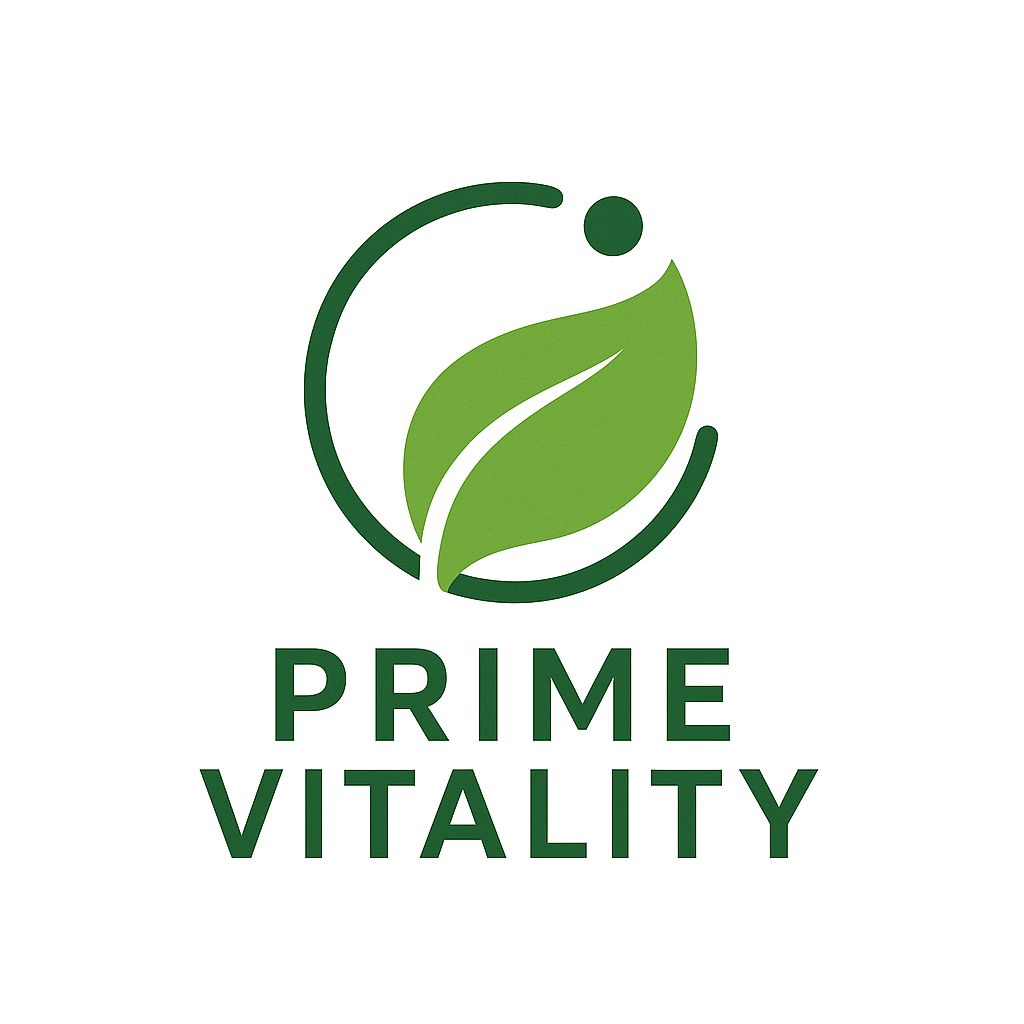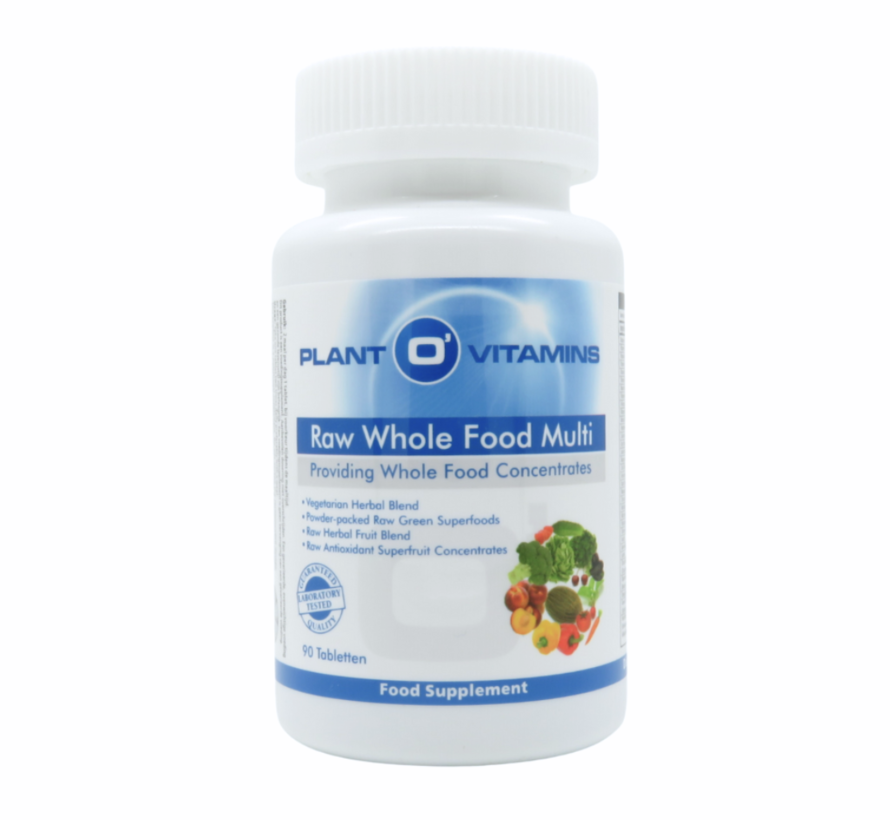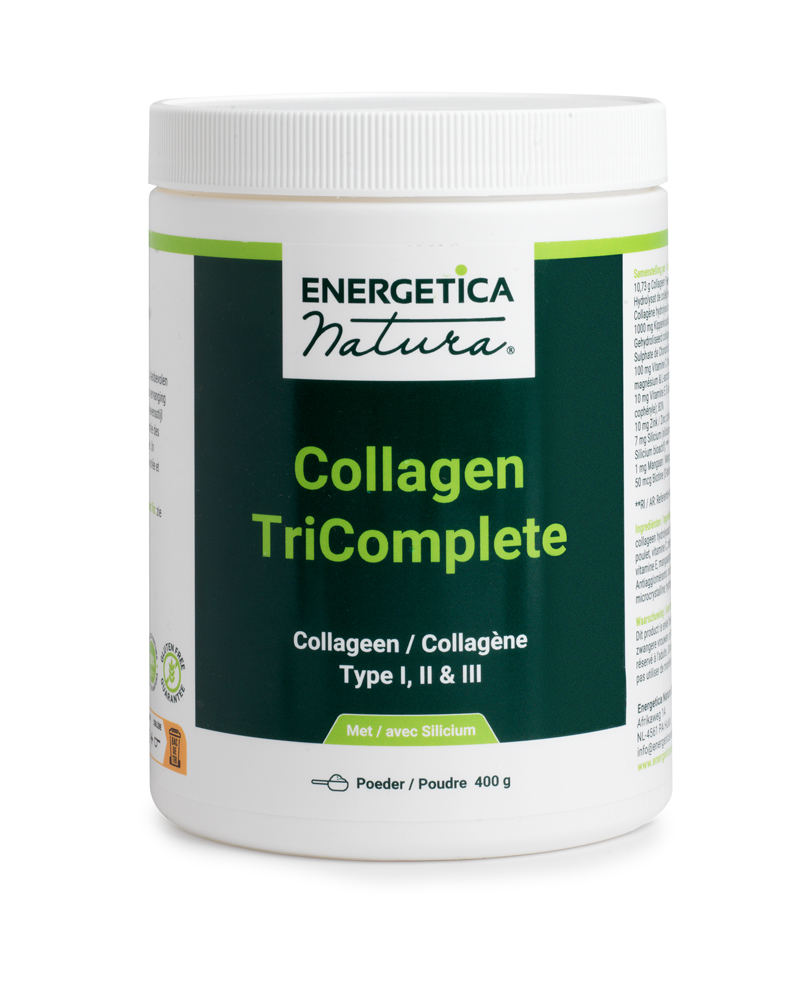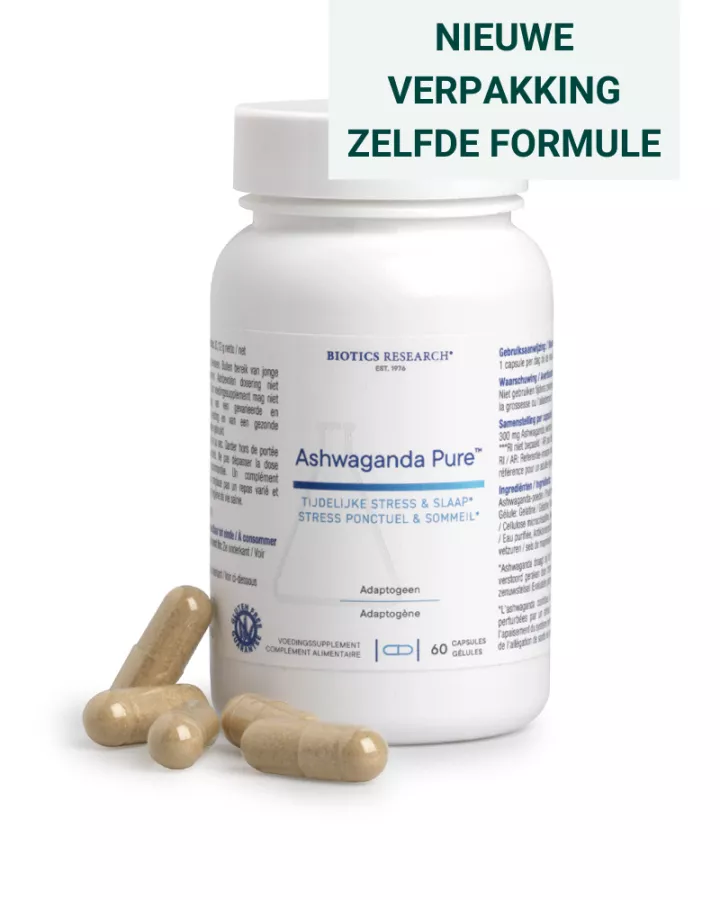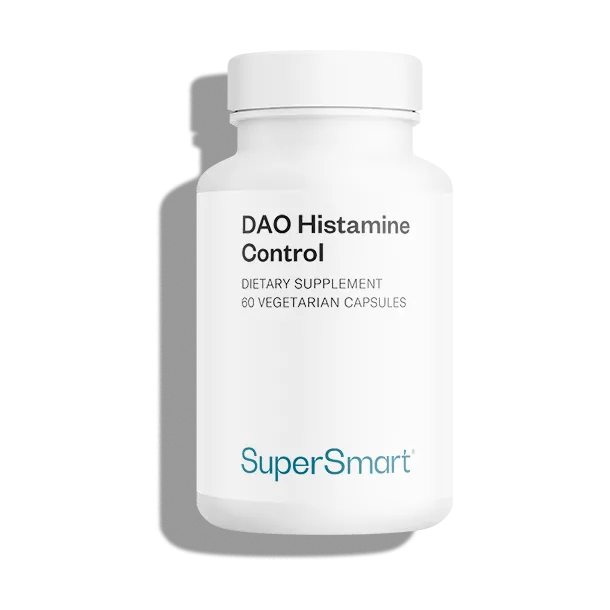Raw Whole Food Multi Plantovitamins 90 tablets
Background Information
Carefully crafted and comprehensive green multivitamin with over 60 active ingredients. The best fruits and vegetables of certified, organic origin were selected, picked and harvested at the time of optimum ripeness and maturity. They were processed using an exclusive processing method that fully preserves the vitamins and plant enzymes. This results in a very high quality raw food supplement, packed with valuable nutrients, vitamins, minerals, antioxidants and spores, which are a perfect complement to a versatile diet with many different, fresh and unprocessed foods. The Raw Whole Food Multi is a comprehensive multi-vitamin with good value for money. In addition to vitamins, minerals, herbs, including Korean ginseng, ginkgo, echinacea, 3 types of mushrooms, reishi, shiitake, maitake, the Raw Whole Food Multi also contains enzymes and a plant-based omega blend.
A look at the allowed claims gives a comprehensive picture of how this multivitamin works.
Composition
contains per tablet
– Vitamin A (Beta-carotene) 250 mcg (833.33 IU)
– Vitamin C (Calcium ascorbate) 40 mg
– Vitamin D3 (from lichen) 16.67 mcg (666.67 IU)
– Vitamin E (D-alpha-tocopheryl acetate) 6.71 mg (10 IU)
– Thiamine (B1) (Thiamine mononitrate) 8.33 mg
– Riboflavin (Vitamin B2) 8.33 mg
– Niacin (Niacinamide) 8.33 mg
– Vitamin B6 active form (Pyridoxal-5-phosphate) 7 mg
– Folic acid (Active folate 5-methyltetrahydrofolate) 133.33 mcg
– Vitamin B12 (Methylcobalamin) 166.67 mcg
– Biotin (D-biotin) 333.33 mcg
– Pantothenic acid (Calcium pantothenate) 10 mg
– Calcium (Calcium carbonate) 40 mg
– Iron (ferrous sulfate) 6 mg
– Iodine (potassium iodine) 50 mcg
– Magnesium (Magnesium Citrate) 20 mg
– Zinc (Zinc Citrate) 5 mg
– Selenium (Sodium selenite) 8.33 mcg
– Copper (copper gluconate) 0.17 mg
– Manganese (Manganese sulfate) 0.67 mg
– Chromium (Chromium Picolinate) 33.33 mcg
– Molybdenum (Sodium molybdate) 17 mcg
– Sodium 3.33 mg
– Potassium (potassium chloride) 16.67 mg
– Choline (Choline bitartrate) 3.33 mg
– Inositol 3.33 mg
– Boron (Sodium tetraborate) 0.33 mg
– Lutein 3.33 mcg
– Citrus Bio Complex (Citrus bioflavonoid complex, Hesperidin complex, Rutin, Quercetin) 16.67 mg
– Digestive Enzyme Blend 16.67 mg
– Betaine HCL, Bromelain (from pineapple), Papain (from papaya), Amylase, Lipase, Cellulase, Protease
– Omega blend 33.33 mg
– Flaxseed, Borage powder
– Green & Whole Food Blend 140 mg
Spirulina (spirulina platensis – plant), Chlorella (chlorella vulgaris – plant), Apple pectin (fruit), Sodium copper, Chlorophyllin
– Herbal blend 33.33 mg
Red sunflower (echinacea purpurea – above ground plant), Ginger (zingiber officinale – root), Milk thistle (silybum marianum – seed), Cayenne (capsicum annuum – fruit), Korean ginseng extract (panax ginseng root), Ginkgo biloba extract (ginkgo biloba – leaf), Canadian turmeric (hydrastis canadensis – root)
– Vegetable blend 33.33 mg
Parsley powder, Garlic (allium sativum – bulb), Cauliflower and Carrot powder extract, Red beet powder, Broccoli extract, Kale
– Fruit blend 33.33 mg
Papaya fruit powder, Grapefruit extract, Apple powder (Malus pumila), Peach powder, Acai (Euterpe oleracea), Cranberry extract (vaccinium macrocarpon), American blueberry extract (vaccinium corymbosum), Bilberry (vaccinium myrtillus), Pineapple (Ananas comosus), Orange (Citrus sinensis), Noni powder (Morinda citrifolia)
– Mushroom blend 16.67 mg
Shiitake (lentinus edodes – above ground plant), Reishi (ganoderma lucidum – above ground plant), Maitake extract (grifola frondosa)
– L-Leucine 52 mg
Ingredients (other substances)
Microcrystalline cellulose, Sodium-carboxymethylcellulose, Leucine, coating.
Allowed claims
Vitamin A
– Blood calcium levels
Vitamin D3 contributes to normal blood calcium levels.
– Blood cells
Riboflavin (vitamin b2) contributes to the maintenance and maintenance of normal red blood cells.
Vitamin B12 contributes to normal red blood cell formation and aids in the production of red blood cells.
– Blood coagulation
Calcium contributes to normal blood coagulation and supports blood clotting.
– Blood vessels
Vitamin C contributes to normal collagen formation for normal blood vessel function.
Vitamin C is important for the good condition of blood vessels.
Vitamin C is beneficial for supple/elastic veins and supports the maintenance of a strong vessel wall.
– Bone collagen/bone
Vitamin C contributes to normal collagen formation for normal bone function.
Vitamin C contributes to the maintenance of strong bones.
Vitamin C plays a role in bone production.
Vitamin D contributes to normal growth and development of children’s bones and is good for children’s skeleton.
Vitamin D contributes to the maintenance of normal bones.
Vitamin D increases bone calcium absorption.
Vitamin D plays a role in bone formation.
Vitamin D contributes to normal absorption of calcium and phosphorus.
Calcium is required for normal growth and development of children’s bones and is important for the normal growth development of children’s bones.
Calcium is needed to maintain normal bones.
– Bone collagen/cartilage
Vitamin C contributes to normal collagen formation for normal cartilage function.
Good for cartilage.
Vitamin C for the maintenance of healthy cartilage.
Vitamin C plays a role in the creation/building of cartilage.
Magnesium contributes to the maintenance of normal and strong bones.
Magnesium supports bones, is good for the skeleton and plays a role in bone formation.
Zinc contributes to the maintenance of normal bones and supports bone health.
– Cell division
Vitamin A plays a role in the cell specialization process.
Vitamin D contributes to normal cell division.
Vitamin D contributes to cell and tissue production and the process of cell renewal.
Magnesium contributes to normal cell division and has a beneficial effect on the cell division process.
Magnesium contributes to the production of cells and tissues and to the process of cell renewal.
Zinc plays a role in the cell division process and contributes to normal cell division.
Calcium has a beneficial effect on the cell division process.
Vitamin B12 plays a role in the cell division process and contributes to normal cell division.
Vitamin B12 is good for the cell division process and plays a role in (the process of) tissue growth and development.
Vitamin B12 contributes to cell and tissue production and aids in the process of cell renewal.
– Cells
Zinc contributes to the protection of cells from oxidative damage. It has antioxidant activity/is an antioxidant. It helps protect against influences of pollution and sunlight. It helps protect cells from oxidative damage caused by UV radiation and air pollution.
– Protein Synthesis
Magnesium contributes to normal protein synthesis and helps build body protein.
Zinc contributes to normal DNA synthesis and plays a role in protein synthesis. Also contributes to normal protein synthesis.
– Electrolyte Balance
Magnesium contributes to proper electrolyte balance.
Magnesium provides support in maintaining the normal balance of water and mineral balance.
– Energy
Vitamin C contributes to normal energy-yielding metabolism.
Vitamin C activates your natural energy in the body.
Vitamin C plays a role in the activity of certain enzymes involved in energy metabolism.
Vitamin C helps release energy from food.
Thiamide (vitamin B1) contributes to normal energy-generating metabolism.
Thiamide activates your natural energy in the body.
Thiamide helps release energy from food.
Thiamide plays a role in the activity of certain enzymes involved in energy metabolism.
Magnesium contributes to normal energy-yielding metabolism and activates your body’s natural energy.
Magnesium helps release energy from food, supports energy metabolism and supports energy levels.
Magnesium plays a role in the activity of certain enzymes involved in energy metabolism.
Calcium activates your natural energy in the body and contributes to normal energy balance.
Riboflavin (vitamin b2) activates your natural energy in the body and promotes energy metabolism.
Niacin (vitamin b3) promotes energy metabolism.
Pantothenic acid (vitamin b5) activates the body’s natural energy and promotes energy metabolism.
Vitamin B12 contributes to normal energy-generating metabolism.
Vitamin B12 activates your natural energy in the body.
Vitamin B12 helps release/dissolve energy from fat, carbohydrates and proteins.
Vitamin B12 supports energy levels and plays a role in the activity of certain enzymes involved in energy metabolism.
Biotin (vitamin b8) activates your natural energy in the body.
– Eyesight
Zinc is good for vision.
Riboflavin (vitamin b2) contributes to the maintenance of normal vision and helps maintain normal vision.
– Hair
Zinc contributes to normal hair growth and maintenance of strong hair.
Biotin (vitamin b8) contributes to the maintenance of normal hair and contributes to normal hair growth.
– Heart
Thiamide (vitamin B1) contributes to normal heart function.
Beneficial effect on the heart.
– Homocysteine
Vitamin B12 contributes to normal metabolism of homocysteine.
– Endocrine
Zinc contributes to the maintenance of normal levels of testosterone in the blood and contributes to normal endocrine function.
Pantothenic acid (vitamin b5) contributes to normal synthesis and metabolism of steroid hormones, vitamin D and some neurotransmitters.
– Skin
Vitamin C contributes to normal collagen formation for normal skin function.
Vitamin C is important for the formation of collagen that helps to strengthen the skin (from within).
Vitamin C helps care for the skin from the inside out.
Vitamin C for maintaining healthy skin.
Zinc contributes to the maintenance of normal skin and is for the maintenance of normal skin structure and function.
Riboflavin (vitamin b2) contributes to the maintenance of normal skin. Helps care for the skin from the inside out.
Niacin (vitamin b3) for maintaining normal skin structure and function and for maintaining normal skin and mucous membranes.
Biotin (vitamin b8) for maintaining normal skin and mucous membranes and for maintaining normal skin structure and function.
– Iron
Vitamin C increases iron absorption.
Vitamin C promotes the absorption of iron into the blood.
Vitamin C increases iron levels in the blood.
Riboflavin (vitamin b2) promotes the availability of iron from body stores and is beneficial for (normal) iron metabolism.
– Immune system- physical exercise
Vitamin C contributes to maintaining the normal function of the immune system during and after strenuous physical exercise.
Vitamin C helps maintain good/strong resistance in cold environments. Vitamin C provides extra resistance during physical exertion.
– Immune system – normal function
Vitamin C contributes to the normal function of the immune system.
Vitamin C helps the (natural) immune system of the body’s cells.
Vitamin C supports the immune system.
Vitamin D contributes to normal immune system function in children.
Vitamin D has a positive influence on children’s immune system and helps to ensure that children have a good immunity.
Vitamin D helps the natural immune system of the body cells (of children).
Vitamin D contributes to the normal function of the immune system.
Vitamin D helps ensure good immunity.
Vitamin D supports the body’s defenses.
Zinc contributes to the normal functioning of the immune system and helps ensure a good resistance.
Vitamin B12 contributes to the normal function of the immune system and has a positive influence on the immune system.
Vitamin B12 supports the (natural) immune system of the body’s cells.
– Metabolism
Zinc contributes to normal acid-base balance/metabolism.
– Mouth and teeth – preserving teeth
Vitamin C contributes to normal collagen formation for normal tooth function.
Vitamin C is important for the formation of collagen which is important for gums.
Vitamin C is important for teeth.
Vitamin C is important for maintaining strong teeth.
Magnesium helps maintain normal teeth and strong teeth.
Magnesium is important for building strong teeth and maintaining strong teeth.
Calcium is needed for teeth and contributes to strong teeth.
– Mouth and teeth – gums
Vitamin C contributes to strong teeth.
Vitamin C supports teeth.
Vitamin D helps maintain normal teeth and strong teeth.
Vitamin D is for maintaining strong teeth.
– Nails
Zinc is good for nails.
– Oxidative damage
Vitamin C helps protect cells from oxidative damage.
Vitamin C is an antioxidant.
Vitamin C helps protect against influences of pollution and sunlight.
Vitamin C helps protect body cells from external influences.
Vitamin C contributes in trapping free radicals in (body) cells.
Vitamin C to protect against free radicals.
Vitamin C for maintaining cells and tissues.
Vitamin E contributes to the protection of cells from oxidative damage.
Vitamin E helps protect healthy body cells.
Vitamin E is an antioxidant.
Riboflavin (vitamin b2) is an antioxidant, helps protect against influences of pollution and sunlight and helps protect healthy body cells.
– Psychological function
Vitamin C contributes to normal psychological function.
Vitamin C in mental exertion.
Vitamin C contributes to (brain and nerve functions involved in) concentration and the ability to learn.
Vitamin C contributes to clear mind.
Vitamin C contributes to memory function.
Vitamin C contributes to learning performance.
Vitamin C for mental energy.
Thiamide (vitamin B1) contributes to normal psychological function.
Magnesium contributes to normal psychological function.
Magnesium contributes to a clear mind, mental resilience and contributes to (brain and nerve functions involved in) concentration.
Magnesium in mental exertion and contributes to normal mental performance/
capacity/normal psychological functioning.
Magnesium contributes to brain and nerve functions involved in reasoning/reasoning and contributes to memory functioning.
Magnesium is good for mood and learning performance.
Magnesium is good for mental balance and mental energy.
Zinc contributes to normal cognitive function and normal memory and learning ability.
Niacin (vitamin b3) contributes to concentration (involved in brain and nerve functions) and contributes to mental resilience.
Pantothenic acid (vitamin b5) contributes to normal mental performance and helps with mental exertion/pressure. It supports during busy work and exciting times. It helps with mental exertion and pressure.
Vitamin B12 contributes to normal psychological function.
Vitamin B12 in mental exertion.
Vitamin B12 contributes to concentration and is good for memory.
Vitamin B12 is good for mood and is beneficial for good mental balance.
Biotin (vitamin b8) contributes to concentration, mental resilience and contributes to
normal psychological functioning.
Also contributes to brain and nerve functions involved in learning ability.
– Regeneration vitamin E
Vitamin C contributes to the regeneration of the reduced form of vitamin E.
Vitamin C acts as an antioxidant for vitamin E, bringing it back to an active/working form.
– Mucilages
Riboflavin (vitamin b2) contributes to the maintenance of normal mucous membranes.
Niacin (vitamin b3) is good for mucous membranes and aids in the normal function of mucous membranes.
Biotin (vitamin b8) aids in the normal function of mucous membranes.
– Muscles – fall risk (disease risk reduction claim)
Vitamin D helps to reduce the risks of falls, associated with postural instability and muscle weakness. Falling is a risk factor for bone fractures in men and women age 60 and older.
– Muscles – action
Vitamin D contributes to normal muscle function and helps maintain normal muscle function.
Vitamin D is important for normal muscle function and plays a role in maintaining smooth and strong muscles.
Magnesium contributes to normal muscle function and is good for muscles.
Magnesium plays a role in maintaining smooth and strong muscles.
Calcium contributes to normal muscle function and has a beneficial effect on heart muscle.
– Digestive
Calcium contributes to the normal function of digestive enzymes, supports digestion.
– Metabolism
Biotin (vitamin b8) contributes to normal metabolism of carbohydrates, fat and proteins (macronutrients).
Zinc contributes to the normal metabolism of vitamin A.
Zinc contributes to normal metabolism of carbohydrates, fat and protein (macronutrients).
Zinc plays a role in building and breaking down carbohydrates, fats, proteins and nucleic acids.
– Fatigue
Vitamin C helps reduce fatigue and tiredness.
Vitamin C can help reduce the lack of energy.
Magnesium contributes to the reduction of fatigue and tiredness.
Magnesium helps with fatigue/fatigue.
Magnesium for lethargy.
Magnesium contributes extra energy to fatigue.
Riboflavin (vitamin b2) is beneficial in reducing fatigue and tiredness.
Niacin (vitamin b3) contributes to the reduction of fatigue and tiredness.
Pantothenic acid (vitamin b5) contributes to the reduction of fatigue and tiredness.
For lethargy, fatigue, can help reduce lack of energy.
Vitamin B12 contributes to the reduction of fatigue and tiredness.
Vitamin B12 supports the reduction of fatigue and tiredness.
Vitamin B12, for lethargy, fatigue and tiredness.
– Fertility
Zinc contributes to normal fertility and reproduction. Contributes to sperm production and contributes to normal male and female fertility.
– Nervous System
Vitamin C contributes to normal nervous system function.
Vitamin C has a positive effect on nervous system function.
Magnesium contributes to normal nervous system function and is important for the nervous system.
Calcium contributes to normal stimulus transmission in the nerves and contributes to normal nervous system function.
Riboflavin (vitamin b2) contributes to normal nervous system/nerve function.
Niacin (vitamin b3) contributes to the normal functioning of nerves/nervous system.
Vitamin B12 contributes to normal nervous system function and nerve function.
Vitamin B12 plays an important role in nerve function and helps ensure the proper functioning of the nervous system.
Biotin (vitamin b8) supports normal nervous system function.
